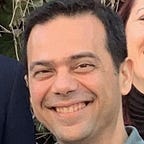Bombs, cash assistance and hugs: the life of a WFP staffer
In 1997 Azhar Alazzawi decided that humanitarian work was her calling and joined the World Food Programme. She currently heads WFP`s Gaziantep Area Office in southeastern Turkey.
Escaping almost certain death by a mere 10 minutes would be enough to send most people looking for a safer career. Cheating death twice in similar circumstances would make such a choice inevitable.
However, Azhar Alazzawi is not “most people”.
“Surrounded by death and the unknown, all you feel is a sense of helplessness,” she says. “I told myself I cannot afford to be afraid and need to do all I can to help.”
This was how the Babylon-born Iraqi woman mustered the strength to deal with the aftermath of one of the most horrific attacks on the United Nations.
On 19 August 2003 Azhar had left the UN headquarters in Iraq at Baghdad`s Canal Hotel for a meeting. Just 10 minutes later the venue was the target of a bombing, which left 22 dead and more than 100 people wounded.
That incident strengthened Azhar’s resolve to try and help people in need.
“For a long time my country has seen nothing but war. First there was eight years of war with Iran, then the Gulf War and the sanctions years, followed by the occupation and the internal strife that has resulted since,” she says.
Personal loss
In these wars she lost two brothers. Their only fault was to be of conscription age and hence drafted to serve in the military.
All this was a far cry from her childhood and early adult life.
Raised in a family with huge appreciation for education, and one that treated their sons and daughters equally, Azhar pursued a career that saw her become a professor in Baghdad in 1979.
By 1997, she had decided that humanitarian work was her calling and joined the World Food Programme (WFP), as the agency became active in Iraq during the sanctions years.
She found the work fulfilling but working conditions gradually worsened as local resentment at what many saw as American occupation grew.
“Just because we spoke English and worked for the UN, many people immediately thought we must be collaborators with the occupying forces,” says Azhar.
The situation was deteriorating rapidly.
In November 2006, she was at the Iraqi Health Ministry for a meeting when a car bomb targeting the ministry left her amidst dead bodies and pools of blood.
WFP asked her to move to Amman, Jordan, for a week. That became a temporary deployment which was extended. Other temporary deployments followed, taking her to Haiti, the Egyptian-Libyan border, then Egypt and Libya itself.
In 2012, Azhar had already accepted a deployment to Syria when she received a call. WFP was now asking her if she would like to head the Gaziantep office in Turkey as part of the Syria emergency operation.
At first she hesitated. She had already committed to going to Syria. She was also asking herself how anything in Gaziantep could be considered an ‘emergency’.
Looking back, she smiles at that thought. She says the way the job has evolved and the challenges it throws up have kept her in Gaziantep for almost half a decade.
WFP`s Gaziantep Area Office covers four field offices and 17 provinces. Its operational area is where more than 2.1 million of the estimated 3.6 million Syrian refugee population in Turkey reside.
And it all started with Azhar working out of her hotel room. She was an integral part of building the operation from the ground up.
She has a twinkle in her eye when she recalls some stories from the early days of the operation. One is about how she recruited one of the field monitoring assistants in a silver shop.
“I was looking into a shop window when the owner invited me in for a glass of tea. Whilst talking, the shopkeeper mentioned he knew someone who spoke both Arabic and English. He put her on the phone and then she came to the shop. It turned into an informal job interview in the shop,” says Azhar.
She adds that the person interviewed that day continues to be a key member at the WFP field office in Hatay.
Pain disappears
Azhar has overseen the operation’s shift in focus from in-camp assistance to the Emergency Social Safety Net (ESSN), a European Union-funded multi-purpose cash transfer scheme launched in 2016 that assists more than 1.5 million refugees in Turkey.
The families receiving assistance decide for themselves how to cover essential needs like rent, bills, food, and health needs.
ESSN is implemented by WFP and the Turkish Red Crescent, with vital support from the Turkish government.
Azhar does not know what the future holds but is certain that humanitarian work is all she wants to do.
“All the pain, everything, just disappears when someone you have assisted gives you a hug,” she says.
She says she would do it all over again despite the horrific things she has experienced on her journey. She draws her strength and motivation from the same thought that helped after the two explosions that could have killed her.
“Somebody needs to continue. I am here and alive, so let it be me.”
